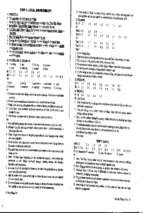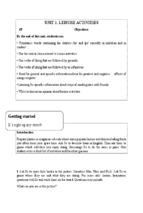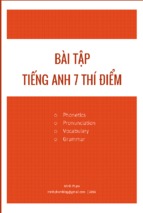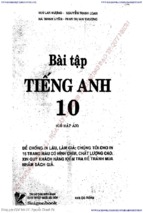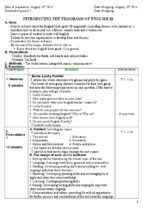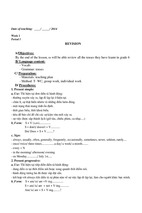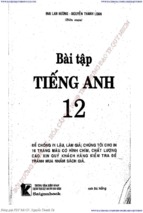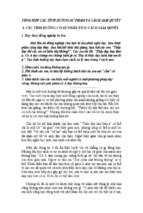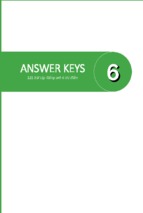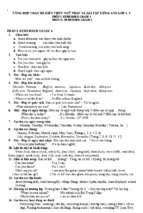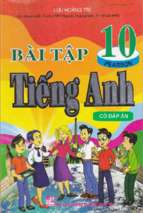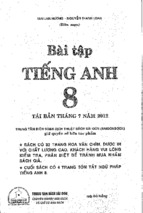TENSES (Các thì)
Grammar I:
CÁC THÌ
1. Present
Simple
(Thì hiện
tại thường)
2. Past
Simple
(Thì quá
khứ
thường)
CẤU TẠO
DẤU HIỆU NHẬN BIẾT
S(plural) (I / We / You / They) + V0
S(singular) (He / She / It)
+ V s/es
S + V 2/ed
-1 haønh
ñoäng, söï
vieäc ñang
dieãn ra vaøo
ñuùng thôøi
ñieåm noùi.now, right
now3.
Future
-1
haønh
ñoäng,
söï
vieäc xaûy ra S + will + V
0
trong töông
lai ñaõ xeáp
ñaët tröôùc.
- at present,
at the
moment, at
this time
- Look ! ,
Listen !
Simple
(Thì tương
lai đơn)
5. PastS + S + was / were + V-ing
am / is / are
+ V-ing
Continuous
(Thì quá
khứ tiếp
diễn)
- always, usually, often
- sometimes, now and then
- seldom, rarely,
- every (day/ week /
month…)
- once (a week / month…)
- twice (a week / month….)
- yesterday, ago, this
morning
- in + time in the past (in
2000)
- last (night/ week / month)
- tomorrow, tonight,
someday
- in + time in the future
(in 2050)
- next (week / month /
year…)
- When / While / As
- At 10.20 yesterday
CÁCH SỬ DỤNG
-1 thoùi quen, 1 söï vieäc
laëp ñi laëp laïi ôû hieän
taïi.
-1 chaân lyù, 1 söï thaät
hieån nhieân.
- Caûm giaùc, traïng thaùi
ôû hieän taïi.
-1 haønh ñoäng, söï vieäc
xaûy ra vaø chaám döùt
trong quaù khöù, bieát roõ
thôøi gian.
- 1 loaït caùc haønh ñoäng
xaûy ra lieân tieáp trong
quaù khöù.
-1 haønh ñoäng, söï
vieäc seõ xaûy ra trong
töông lai.
-1 haønh ñoäng ñang xaûy
ra ôû quaù khöù thì moät
haønh ñoäng khaùc caét
ngang. (when, as).
-2 haønh ñoäng xaûy ra
song song cuøng moät
luùc trong quaù khöù.
(while)
-1 haønh ñoäng xaûy ra
taïi moät thôøi ñieåm trong
quaù khöù.
4. Present
Continuous
(Thì hiện
tại tiếp
diễn)
6. Future
Continuous
(Thì tương
lai tiếp
diễn)
7. Present
Perfect
(Thì hiện
tại hoàn
thành)
S + will + be + V-ing
- at this time/ at 8 o’clock + time
in the future (at 8 o’clock
tomorrow)
- When / while / as + clause
(time in the future)
S + have/has + V 3/ed
8. Present
Perfect
Continuous
S + have/has + been + V-ing
(Thì hiện
tại hoàn
thành tiếp
diễn)
9. Past
Perfect
(Thì quá
khứ hoàn
thành)
10. Future
Perfect
(Thì tương
lai hoàn
thành)
S + had + V 3/ed
- dieãn ra taïi 1 thôøi ñieåm trong
töông lai.
- ñang dieãn ra ôû töông lai luùc
vieäc khaùc xaûy ra.
- dieãn ra suoát 1 quaõng thôøi
gian daøi trong töông lai.
- just, recently, lately
- never, ever, yet, already
- since, for, so far
- up to now, up to the present
- for a long time, for ages
- three (four,...) times , many
times, several times.
- This is the first time/the
second time + S + have/has
V 3/ed
- for, since, up to now...
Ex: I’m tired because I’ve
been working hard.
-1 haønh ñoäng, söï vieäc
vöøa môùi xaûy ra.
-1 haønh ñoäng ñaõ xaûy ra
ôû quaù khöù vaø coøn tieáp
tuïc ñeán hieän taïi.
-1 haønh ñoäng xaûy ra
trong quaù khöù, khoâng
bieát roõ thôøi gian.
-1 haønh ñoäng ñaõ xaûy ra ôû quaù
khöù vaø coøn tieáp tuïc ñeán hieän
taïi, nhaán maïnh söï lieân tuïc cuûa
haønh ñoäng.
- haønh ñoäng ñaõ xaûy ra vaø keát
quaû toàn taïi tôùi luùc ñang noùi.
- before, after, by the time
- when, as soon as
By the time + S + V(QKĐ),
S + had V 3/ed
-1 haønh ñoäng xaûy ra tröôùc 1
haønh ñoäng khaùc hoaëc tröôùc 1
thôøi ñieåm trong quaù khöù.
S + will + have + V 3/ed
- after, before, when
- by the time + time in the
future
By the time + S + V(HTĐ),
S + will have V 3/ed
- Hoaøn taát tröôùc thôøi
ñieåm töông lai hoaëc
tröôùc 1 haønh ñoäng
khaùc ôû töông lai.
- Keùo daøi ñeán 1 thôøi
ñieåm ôû töông lai.
Ex:
1. She goes to school every day.
2. She wrote the letter to her friend two days ago.
2
3. He will visit the most famous pagoda in this city next week.
4. John is reading an interesting book now.
5. When I was walking in the street, I met one of my friends.
6. What will they be doing at this time tomorrow morning?
7. They have lived in London since 2001.
8. He has been teaching English for ten years now.
9. George had waited for an hour before the bus came.
10. Next month, he will have been married for fifteen years.
@ NOTES (Chú ý):
PRESENT SIMPLE
PRESENT CONTINUOUS
PAST SIMPLE
1) ÔÛ ngoâi III, soá ít, ta theâm 1) Khoâng duøng thì naøy ñoái vôùi 1) Ñoái vôùi ñoäng töø ñaëc bieät
“s” vaøo haàu heát caùc ñoäng töø.
caùc ñoäng töø chæ söï nhaän thöùc, (was, were, could, . . ), theâm
tri giaùc, sôû höõu nhö: BE, “not” vaøo chính caùc ñoäng töø
2) Nhöõng ñoäng töø taän cuøng laø HAVE, SEE, KNOW, FEEL, ñaëc bieät neáu laø caâu phuû ñònh,
o, ch, sh, s, x, z ta theâm “es”. LIKE, LOVE . . . Ñoái vôùi caùc vaø ñaûo chính caùc ñoäng töø ñaëc
ñoäng töø naøy, ta thay baèng thì bieät ra tröôùc chuû töø neáu laø
3) Nhöõng ñoäng töø taän cuøng laø
“y”, tröôùc noù laø moät phuï aâm,
y chuyeån thaønh -> i + es
hieän taïi ñôn.
caâu hoûi.
2) Ñoäng töø taän cuøng baèng “e”, 2) Caùch theâm “ED” vaøo sau
(study -> studies). Nhöng boû “e” theâm “ing” (come – ñoäng töø hôïp qui taéc:
a. Ñoäng töø taän cuøng baèng
tröôùc “y” laø moät nguyeân aâm coming).
“e”, chæ theâm “d”.
thì giöõ nguyeân: y + s (play ->
plays).
3) Ñoäng töø (moät vaàn hoaëc hai b. Nhöõng ñoäng töø taän cuøng laø
vaàn coù daáu nhaán troïng aâm ôû “y”, tröôùc noù laø moät phuï aâm,
4) Ñoái vôùi ñoäng töø ñaëc bieät vaàn thöù hai) taän cuøng laø moät y chuyeån thaønh -> i + ed
-> studied). Nhöng
(be, can, may . . .), theâm phuï aâm, tröôùc ñoù chæ coù moät (study
“not” vaøo chính caùc ñoäng töø nguyeân aâm: gaáp ñoâi phuï aâm + tröôùc “y” laø moät nguyeân aâm
ñaëc bieät neáu laø caâu phuû ñònh, “ing” (run - running, begin - thì giöõ nguyeân y + ed (play ->
vaø ñaûo chính caùc ñoäng töø ñaëc beginning).
played).
bieät ra tröôùc chuû töø neáu laø
c. Ñoäng töø (moät vaàn hoaëc hai
caâu hoûi.
4) Ñoäng töø taän cuøng laø “ie”, vaàn coù daáu nhaán troïng aâm ôû
ñoåi “ie” thaønh -> y + ing (lie vaàn thöù hai), taän cuøng laø 1
3
– lying)
phuï aâm, tröôùc ñoù chæ coù 1
nguyeân aâm: gaáp ñoâi phuï aâm
+ ed (stopped, permitted).
SUBJECT & VERB AGREEMENT
(Sự hoà hợp giữa chủ ngữ và động từ)
Grammar II:
I. Subject and Verb in a sentence must agree in Person and Number: (Chủ ngữ và động từ
trong một câu phải phù hợp về ngôi và số)
Ex: Her dress is beautiful.
Those cars are very modern.
II. Some other rules: (Một vài quy tắc khác)
1.
S1 + and + S2 + V (plural)
Ex: He and his friends are good students.
John and I are going to play tennis.
2.
with / together with
S1 + along with / as well as + S2 + V (S1)
accompanied by
Ex: The actress, along with her manager and some friends, is going to a party tonight.
3.
Either
or
Neither
+ S1 +
nor + S2 + V (S2)
Not only
but also
Ex: Either you or I am wrong
Neither Tom’s parents nor his teacher is satisfied with his progress.
4.
Every
Noun (singular)
Each +
+ V (singular)
Either
Neither
of + Noun (plural)
Ex: Every child has a toy.
Each job needs patience.
Each of the patients is examined every day.
5.
Every / some
Any / no
+
one / body / thing
+
V (singular)
4
Ex: Everyone is ready.
6.
A number of
+
Noun (plural)
+ V (plural)
The number of
+
Noun (plural)
+ V (singular)
Ex: A number of the applicants have already been interviewed.
The number of days in a week is seven.
7.
S (N + preposition phrase)
+
V(N)
Ex: The study of languages is very interesting.
8.
Gerund (as Subject)
+ V (singular)
Ex: Writing many letters makes her happy.
THE USES OF VERBS
(Cách sử dụng của động từ)
Grammar III:
I. INFINITIVE: Infinitive ñöùng sau caùc ñoäng töø sau ñaây:
agree
desire
manage
promise
arrange
expect
mean
propose
attempt
fail
need
refuse
ask
help
offer
seem
decide
hope
plan
tend
demand
intend
prepare
want
determine
learn
pretend
wish
Ex: He doesn’t want to know.
advise
order
allow
permit
ask
request
enable
tell
encourage
want
expect
warn
invite
wish
Ex: He advised me to leave here early.
II. GERUND: Gerund (V-ing) ñöùng sau caùc ñoäng töø sau ñaây:
admit
deny
miss
resist
appreciate
enjoy
postpone
risk
avoid
finish
practise
suggest
can’t help
keep
prevent
understand
consider
imagine
quit
delay
mind
resent
Ex: We enjoy playing football.
III. NOTES (Lưu ý):
A. GERUND or INFINITIVE: Thay đổi về nghĩa
Động từ
Remember
1
+ to V (hành động chưa xảy ra)
Ví dụ
Please remember to return the book
tomorrow.
Forget
Regret
2
Nghĩa
Stop
+ V-ing (hành động đã xảy ra)
+ to V (dừng lại để làm việc khác)
I’ll never forget seeing her at the first time.
He stopped to eat. (dừng công việc để ăn)
5
+ V-ing (từ bỏ, dừng việc đang làm)
My father stopped smoking two months ago.
(bỏ hút thuốc)
+ to V (cố gắng làm việc gì)
3
I will try to study hard so that my
parents stop worrying about me.
Try
+ V-ing (thử làm việc gì)
He tried making a cake but he didn’t succeed.
B. VERBS OF PERCEPTION: (Các động từ chỉ sự nhận thức)
hear
see
smell
+
feel
notice/ watch
Ex:
Vo (söï hoaøn taát cuûa haønh ñoäng)
O
+
V-ing (söï tieáp dieãn cuûa haønh ñoäng)
We saw him leave the house.
She smelt something burning and saw smoke rising.
C.
Make / let + O + Vo
Ex:
He made me move my car.
D.
Modal Verbs (will, can, may, must, should, need, had better, have to, ought to ...) + Vo
Ex:
The children had better go to bed early.
Grammar IV:
INVERSION OF THE VERB
(Sự đảo ngữ của động từ)
Động từ được sử dụng ở dạng đảo ngữ sau một số trạng từ và cụm trạng từ nhất định nếu
chúng được đặt ở vị trí đầu trong một câu hoặc một mệnh đề.
Never
: khoâng bao giôø, chöa bao giôø
Seldom
: ít khi
Only by
: chæ baèng caùch
Only then / when
: chæ luùc ñoù, chæ khi
Not only (… but also)
: khoâng nhöõng … maø coøn
Not until
: maõi cho ñeán khi
Hardly ever
: ít khi
Hardly + had +S + Vp2 … when + S + Ved = Scarcely … when
: vöøa môùi … thì
No sooner + had + S+ Vp2 …than + S + Ved
: vöøa môùi … thì
So … that …
: ñeán noãi maø
Neither / Nor
: cuõng khoâng
6
So
: cuõng vaäy
Nowhere
: khoâng nôi naøo
In no circumstances
: khoâng ôû tröôøng hôïp naøo
On no account
: khoâng vì lí do gì
Ex: 1. He had hardly gone into the house when it rained.
Hardly had he gone into the house when it rained.
Scarcely had he gone into the house when it rained.
No sooner had he gone into the house than it rained.
2. He didn’t return to his native village until the war ended.
(It was not until the war ended that he returned to his native village)
Not until the war ended did he return to his native village
3. The question is so difficult that nobody can answer it.
So difficult is the question that nobody can answer it.
@ Lưu ý:
1. Bill enjoys a game and Tom does, too.
= Bill enjoys a game and so does Tom.
2. He didn’t like the book and I didn’t, either.
= He didn’t like the book and neither / nor did I.
Grammar V:
REPORTED SPEECH
(Câu gián tiếp)
A. STATEMENTS (Câu trần thuật): Cách chuyển từ câu trực tiếp sang gián tiếp
Cấu tạo:
S + said
(that) + S + V (lùi 1 thì)
S + told + O (that) + S + V (lùi 1 thì)
Đổi động từ ở mệnh đề chính thành: said, told …
Đổi các đại từ, tính từ sở hữu
Đổi thì động từ.
Đổi các trạng ngữ (thời gian, nơi chốn)
1. Các đại từ, tính từ sở hữu:
Chủ ngữ
Tân ngữ
Tính từ sở hữu
I
me
my
you
your
hishisYou
her
her
Shehim
He
It
it
its
We
us
our
You
you
your
They
them
their
Đại từ sở hữu
mine
yours
hers
its
ours
yours
theirs
2. Thì động từ:
Direct speech
1. Present simple
Ex: go
Reported speech
1. Past simple
Ex: went
7
2. Present progressive
Ex: is going
3. Present perfect / Past simple
Ex: have done
swam
4. Past progressive
Ex: was / were going
5. Future simple
Ex: will
6. can/ must
2. Past progressive
Ex: was / were going
3. Past perfect
Ex: had done
had swum
4. Past perfect progressive
Ex: had been going
5. Future in the past
Ex: would
6. could/ had to
3. Trạng ngữ thời gian & địa điểm:
Direct speech
Reported speech
This
That
These
Those
Here
There
Now
Then
Today
That day
Yesterday
The day before / the previous day
Tomorrow
The day after / the following day / the next day
Ago
Before
This week
That week
Last week
The week before / the previous week
Next week
The week after / the following week / the next week
@ Chú ý:
Neáu ñoäng töø ôû meänh ñeà chính ôû thì hieän taïi ñôn, ta chæ ñoåi ñaïi töø trong lôøi trích daãn.
Ex: The farmer says, “I hope it will rain tomorrow.”
The farmer says that he hopes it will rain tomorrow.
She says, “I’m tired now.”
She says that she is tired now.
Neáu ñoäng töø ôû meänh ñeà chính ôû thì quaù khöù ñôn, ta phaûi ñoåi thì, ñaïi töø, töø vaø cuïm töø
chæ thôøi gian, nôi choán trong lôøi trích daãn.
Ex: Judy said, “I will phone you tomorrow.”
Judy told me (that) she would phone me the day after.
B. COMMANDS (Câu yêu cầu):
Cấu tạo:
S + told / asked + O + (not) to V
Ex: “Hurry up, Lan”
He told Lan to hurry up.
“Don’t make noise in class, please!”
The teacher asked them not to make noise in class.
C. QUESTIONS (Câu hỏi):
Form:
wh+ S + V
S + asked + O
if / whether + S + V
1. Wh-Questions:
Ex: “What time does the film begin?”
He asked me what time the film began.
2. Yes-No Questions:
8
Ex: “Have you seen that film?”
He asked me if I had seen that film.
@ Chú ý:
A. REPORTED SPEECH with INFINITIVE (Câu gián tiếp với động từ nguyên thể):
Cấu tạo:
V + to V-inf
V + O + to V-inf
promise : hứa
tell
: bảo
warn
: cảnh báo
agree
: đồng ý
ask
: yêu cầu
encourage : khuyến khích
hope
: hy vọng
want
: muốn
order
: ra lệnh
offer
: đề nghị
advise
: khuyên
invite
: mời
want
: muốn
remind
: nhắc nhở
Ex: “I will help you, Mary” said Peter
Peter promised to help Mary.
Ex: “Look at the board, please!”, said the teacher.
The teacher asked the students to look at the board.
Ex: “Remember to turn off TV before going to bed”, my father said to me
My father reminded me to turn off TV before going to bed.
B. REPORTED SPEECH with GERUND (Câu gián tiếp với động danh từ):
Cấu tạo:
S + V
S + V +
suggest
admit
deny
V-ing
+
S + V +
(O) (prep)
prep
+ V-ing
+ V-ing
insist on
dream of
think of
look forward to
apologize (to sb) for
S + V + O + prep + V-ing
accuse sb of
thank sb for
congratulate sb on
prevent sb from
warn sb against
Ex: “Let’s go out for a drink,” Susan said.
Susan suggested going out for a drink.
“I’ll help you with your physics exercise,” Peter said to Susan.
Peter insisted on helping Susan with her physics exercise.
Tom said to me, “It was nice of you to help me. Thank you very much.”
Tom thanked me for helping him.
C. CONDITIONAL IN REPORTED SPEECH (Điều kiện trong câu gián tiếp):
TYPE
DIRECT SPEECH
1
“If it rains, I will stay at home to read
books,” said the boy.
REPORTED SPEECH
- The boy said that if it rained, he would
stay at home to read books.
2
“If I were a millionaire, I could help poor - The man told me if he were a millionaire,
children,” said the man.
he could help poor children.
3
“If you had had breakfast, you wouldn’t - The man told me if I had had breakfast,
have been hungry,” said the man.
I wouldn’t have been hungry.
9
Cách chuyển từ lời nói trực tiếp sang gián tiếp:
Đổi động từ ở mệnh đề chính thành: said, told …
Thì động từ:
-
Type 1: luøi laïi 1 thì khi ñoäng töø töôøng thuaät ñöôïc duøng ôû thì quaù khöù.
-
Type 2, 3: giöõ nguyeân thì ñoäng töø
Các đại từ, tính từ sở hữu
Các trạng ngữ (thời gian, nơi chốn)
THE PASSIVE VOICE (Thể bị động)
Grammar VI:
A. Cấu tạo:
S + be + V3, ed ( A(place) + by O + A(time))
Ex: The book was written by Mark Twain
B. Cách chuyển sang thể bị động:
Active: S
V
Passive: S
Thì
BE + V3, ed
O
by + O
Chủ động
Bị động
1. Simple present
S + Vo/ s/ es
S + am/ is/ are + V3/ ed
2. Simple past
S + V2/ ed
S + was/ were + V3/ ed
3. Simple future
S + will/ can + be + V3/ ed
S + will/ can + Vo
4. Present continuous
S + am/ is/ are + V-ing
S + am/ is/ are + being + V3/ ed
5. Past continuous
S + was/ were + V-ing
S + was/ were + being + V3/ ed
6. Present perfect
S + has/ have + V3/ ed
S + has/ have + been + V3/ ed
7. Past perfect
S + had + V3/ ed
S + had + been + V3/ ed
Ex:
1. John delivers the newspapers every morning.
The newspapers are delivered by John every morning.
2. My mother wrote that letter.
That letter was written by my mother.
3. They will build a new school here next month.
A new school will be built here next month.
10
4. He is asking me a lot of questions.
I am being asked a lot of questions.
5. She was doing her homework at that time.
Her homework was being done at that time.
6. My mother has made that cake.
That cake has been made by my mother.
7. They had prepared a party before we came.
A party had been prepared before we came.
@ Chú ý:
A. Causative forms (Dạng động từ nguyên nhân): have, get
VERBS
KINDS
Have
FORMS
Chủ động
S + have + O (person) + Vo
Bị động
S + have + O (thing)
+ V3/ed
S + get
+ V3/ed
Chủ động
S + get + O
(person) + to
V
Get
Bị động
+ O (thing)
Ex:
1. I had him repair my bicycle yesterday.
I had my bicycle repaired yesterday.
2. I get her to make some coffee.
I get some coffee made.
B. Verbs of opinion (Các động từ chỉ quan điểm): say, think, believe, know, report …
KINDS
Chủ động
FORMS
S1
+
It
S2
VS1
+
that
+
S2
+
VS2
+ be V3/ ed
+
that
+
S2
+
VS2
+ be V3/ ed
+
Bị động
to V(S2)
to have V3/ ed
Ex:
People say that he is a famous doctor.
It is said that he is a famous doctor.
He is said to be a famous doctor.
People believe that he drove through the town at 90 km an hour.
It is believed that he drove through the town at 90 km an hour.
11
He is believed to have driven through the town at 90 km an hour.
Grammar VII:
CONDITIONAL SENTENCES
(Câu điều kiện)
TYPES
IF CLAUSE
1. Real in the Present
or Future Possible
(coù thaät ôû hieän taïi hoaëc coù
theå xaûy ra ôû töông lai)
S + will / can + Vo
S + V1
S + V2/ ed
(past subjunctive)
3. Unreal in the Past
S + had + V3/ ed
Ex:
S
+ V (o / s / es)
Vo
2. Unreal in the Present
(khoâng coù thaät ôû hieän taïi)
(khoâng coù thaät ôû quaù khöù)
MAIN CLAUSE
(past perfect subjunctive)
S + would / could + Vo
S + would / could + have + V3/ ed
1. If I have time, I will help you.
Please call me if you hear from Jane.
2. If I were you, I would come there.
3. If he had studied hard, he would have passed his exam.
@ Lưu ý:
* Unless = If…not: nếu….không
Ex: Study hard or you will fail the exam.= Unless you study hard, you will fail the exam.
= If you don’t study hard, you will fail the exam.
Ghi chú :
- Sau mệnh đề If hoặc mệnh đề Unless phải có dấu phẩy (,)
- Sau Unless không được dùng dạng phủ định (Ví dụ : không được viết Unless you don’t
write)
*Có thể dùng đảo ngữ thay thế cho If
1. If they were stronger, they could lift the table.
= Were they stronger, they could lift the table.
2. If he had studied hard, he would have passed his exam.
= Had he studied hard, he would have passed his exam.
* Có thể dùng câu điều kiện pha trộn: If + Loại 3, Loại 2
Ex: If you had had breakfast, you wouldn’t be hungry now. (You are hungry now
because you didn’t have breakfast)
* Dạng bài tập : Biến đổi câu. Dựa vào tình huống (thường có 2 câu hoặc 2 mệnh đề) để xác
định
+ 1 câu hoặc mệnh đề chỉ nguyên nhân
+ 1 câu hoặc mệnh đề chỉ kết quả
So
Because
Therefore
+ nguyên nhân
+ kết quả
Because of
As a result
That’s why
=> Áp dụng trong câu điều kiện :
If + (nguyên nhân) , (kết quả)
12
Lưu ý :
+ Nếu tình huống được cho ở thì hiện tại đơn, ta áp dụng câu điều kiện loại 2
+ Nếu tình huống được cho ở thì quá khứ đơn, ta áp dụng câu điều kiện loại 3
+ Câu điều kiện loại 2, loại 3 là không có thật ở hiện tại, quá khứ nên cả hai
mệnh đề trong câu điều kiện phải ở dạng phủ định của câu hoặc mệnh đề ban đầu.
Ex :
He doesn’t hurry, so he misses the train (tình huống hiện tại loại 2)
= If he hurried, he wouldn’t miss the train
They don’t go camping because the weather is bad. (tình huống hiện tại loại 2)
= If the weather weren’t bad, they would go camping.
She sat up late. That’s why she was ill. (tình huống quá khứ loại 3)
= If she hadn’t sat up late, she wouldn’t have been ill.
Ghi chú : Vì theo sau “Because of” là một cụm danh từ nên ta phải biến đổi cụm danh từ này
thành mệnh đề trước khi đưa vào mệnh đề If.
Ex:
He doesn’t go to school because of his illness. (his illness = he is ill)
= If he weren’t ill, he would go to school.
@ SOME OTHER CASES (Một vài trường hợp khác):
Các liên từ
Nghĩa
If … not = unless
nếu … không
or, or else, otherwise
nếu không thì
- You can camp here
provided you leave no
mess.in case
trong trường hợp,
phòng khi
Ví dụ
- If you do not study harder, you will get low grade.
= Unless you study harder, you will get low grade.
- If he is not here, you can leave.
= Unless he is here, you can leave.
- Go out now or I will call the police
= Go out now, otherwise I will call the police
- You should bring the umbrella in case it rains.
miễn là
provided / providing
(that) / as long as
@ AS IF / AS THOUGH: Như thể là
TYPES
1. Unreal in the Present
FORMS
S + V (present) + as if
(khoâng coù thaät ôû hieän taïi)
2. Unreal in the Past
(past subjunctive)
S + V (past)
+ as if
(khoâng coù thaät ôû quaù khöù)
Ex:
+ S + V2/ ed
+ S + had V3/ ed
(past perfect subjunctive)
1. He acts as though he were rich. (He is not rich)
2. Betty talked about the contest as if she had won the grand prize.
(She didn’t win the grand prize)
@ WISH / IF ONLY (ước muốn/ giá mà)
TYPES
FORMS
1. Future wish (ước ở tương lai)
S + WISH + S would / could + Vo
2. Present wish (ước ở hiện tại)
S + WISH + S + V2/ed (past subjunctive)
13
3. Past wish (ước ở quá khứ)
Ex:
S + WISH + S + had V3/ed (could have V3/ed )
1. I wish I could be an astronaut in the future.
2. I wish I were rich. (I am poor now)
3. She wishes she hadn’t failed her exam last year. (She failed her exam last year.)
RELATIVE CLAUSES
(Mệnh đề quan hệ)
Grammar VIII:
A. Non-defining and defining relative clauses: (Mệnh đề quan hệ hạn định và không hạn
định):
Defining relative clauses: (Mệnh đề quan hệ hạn định )
Ex: The man who is sitting next to you is my uncle.
(coù theå thay theá who, whom, which baèng that)
Non-defining relative clauses: (Mệnh đề quan hệ không hạn định )
Ex: That man, whom you saw yesterday, is Mr. Pike.
(khoâng ñöôïc duøng that ñeå thay theá who, whom, which trong mệnh đề này)
B. Relative pronouns with prepositions (Đại từ quan hệ với giới từ):
Ex: The song is interesting. We like to listen to it.
The song which we like to listen to is interesting.
The song to which we like to listen is interesting.
Dạng:
(Giôùi töø Prep + whom / which
(O)
khoâng ñöùng tröôùc THAT vaø WHO)
C. Omission of relative pronouns (Sự lược bỏ đại từ quan hệ):
Ex: The man whom (that) you met yesterday is my uncle.
The man you met yesterday is my uncle.
The bicycle which (that) I have just bought is blue.
The bicycle I have just bought is blue.
Cấu tạo:
(whom / whom / which + S + V
which làm túc từ thì có thể lược bỏ)
D. Reduced
quan hệ):
(O)
LOẠI
DẠNG RÚT GỌN
Chủ động
V-ing
Bị động
forms of relative clauses (Dạng rút gọn mệnh đề
EXAMPLES
The man who spoke to John is my brother.
The man speaking to John is my brother.
V3, ed
The books which
were written by To
Hoai are interesting.
14
The books
written by To
Hoai are
interesting.
Số thứ tự
To V
Yuri Gagarin was the first man who flew into space.
Yuri Gagarin was the first man to fly into space.
(mệnh đề quan hệ mà danh từ đi trước có the next, the last, the only, superlatives (so sánh cao
nhất) thì rút gọn như ở trường hợp 3.)
@ Lưu ý:
Dùng dấu phẩy trong trường hợp danh từ đi trước có: this, that, these, those (this girl);
my, his … (his car); tên riêng (Mary), vật duy nhất (the telephone, the earth …)
Không được dùng that, không lược bỏ đại từ quan hệ:
o Sau giới từ
o Trong mệnh đề quan hệ có dấu phẩy.
Dùng that khi danh từ đi trước là:
o Người + vật (the man and his dog)
o So sánh nhất (the best, the tallest, the most beautiful …)
o Everything, something, anything, nothing, all, none, very, only, little, few, much
(the very / only person)
E. Relative pronouns and adverbs (Đại từ và trạng từ quan hệ)
Noun + whose + Noun (sở hữu)
Ex : This is the woman whose son won the prize.
What ( the thing which) -> thay cho “một điều nào đó”
Ex : I don’t know what he wants.
S+V , which + V… ( trường hợp này which thay cho cả mệnh đề phía trước)
Ex : I failed the exam, which made me sad
Time + when ( lưu ý when = in/ on which)
Ex : I still remember the day when we first met.
(= on which)
Place + where ( lưu ý where = in/ on/ at which)
Ex : This is the school where I studied.
( = in which)
The reason why (why = for which)
Ex : I don’t know the reason why he said goodbye.
( = for which)
F. CLEFT SENTENCES & CLEFT SENTENCES IN THE PASSIVE (Câu chẻ và câu chẻ ở
dạng bị động)
The boy hit the dog in the garden.
It was the dog that the boy hit in the garden. (Cleft sentence)
It was the dog that was hit in the garden by the boy. (Cleft sentence in the passive)
Form:
CLEFT SENTENCES
FORMS
Chủ động
15
It is / was ……… that +
(S) + V
Bị động
It is / was ……… that +
be V3, ed
Grammar IX: CLAUSES & PHRASES OF REASON &
CONCESSION
(Các mệnh đề và các cụm từ chỉ lý do và sự nhượng bộ)
REASON (lí do)
Clause
MAIN
CLAUSE
S + V
Because
/since /
as
+
S
+ V,
Phrase
Because of
+
N (phrase) / Gerund (phrase),
CONCESSION (Sự nhượng bộ) : Mặc dù, cho dù
Clause
Although/ though / even though +
S + V,
Phrase
In spite
of /
despite
+ N
(phrase)
/
Gerund
(phrase)
,
Ex:
Although it rained heavily, he went to school on time.
In spite of the heavy rain, he went to school on time.
Ex:
Because he was lazy, he failed the exam.
Because of his laziness, he failed the exam.
Grammar X:
TAG QUESTIONS
(Câu hỏi đuôi)
* Form: a tag question = Trợ ĐT + pronoun ?
Mệnh đề (khẳng định), câu hỏi đuôi (phủ định)?
Mệnh đề (phủ định), câu hỏi đuôi (khẳng định)?
Example:
It's a beautiful day, isn't it?
You speak English, don't you?
Ann can't swim, can she?
16
Mr.Hung has never been to Hue city, has he?
Notes (Lưu ý): Các trường hợp đặc biệt
1. I'm late, aren't I?
2. Let's go, shall we?
3. Open the window, will you?
4. Someone had recognized him, hadn't they?
5. Something is wrong with Jane today, isn’t it?
6. There aren’t any problems, are there?
7. That is her umbrella, isn’t it?
USE / USED TO / BE USED TO
Grammar XI:
FORMS
MEANINGS
Use + O
+ to V
dùng, sử dụng
People use money to buy food.
Be used
+ to V
được dùng để (dạng bị động)
Money is used to buy food.
Used to
+ Vo
đã từng (thói quen trong qk)
He used to smoke.
quen với
He is used to getting up early.
Be used to + V-ing
Get used to + V-ing
Grammar XII:
CONJUNCTIONS
(Các liên từ)
FORMS
1
2
Ei
th
er
+
S1
+
or
+
S2
+
V
(S
2)
Both
+ S1 + and + S2 + Vplural
MEANINGS
cả hai
hoặc … hoặc
- Either he or I am
wrong.
- I think she's either
Russian or Polish.
3
Neither + S1 + nor + S2 + V (S2)
không … không
4
không những …mà còn
- Robert is not only
talented but also
handsome.
N
ot
o
nl
EXAMPLES
EXAMPLES
- Both Tom and Ann were late.
- Neither he nor I am happy.
- I am neither rich nor poor.
17
y
+
S1
+
b
ut
al
so
+
S2
+
V
(S
2)
CONNECTORS
Grammar XIII:
(Các từ nối câu)
CONNECTORS
SO
BUT
THEREFORE
MEANINGS
FORMS
vì vậy (biểu thị
kết quả tác động
Clause
soangry,
+ clause
Ex: Tom
was1,too
so 2he left
của vế thứ nhất)
without saying anything)
nhưng (biểu thị
ý
nghĩa
trái
ngược với vế thứ Ex: I tried my best to pass the exam,
nhất)
but I still failed
Sentence 1. However, sentence 2
vì vậy (biểu thị
Clause 1; However, clause 2
kết quả của hành
động trong câu
Clause 1, but + clause 2
Ex: He didn’t study hard. Therefore,
trước đó)
he failed the exam.
He didn’t study hard; therefore, he
failed the exam.
POSITIONS
Liên từ này đứng
trước vế thứ 2 trong 1
câu ghép.
- Liên từ này đứng
đầu 1 câu, ngăn cách
với vế câu đi sau
bằng dấu phẩy.
- Ngoài ra, nó có thể
là từ nối giữa 2 vế
18
Sentence 1.
However,
sentence 2
Clause 1;
However, clause
2
HOWEVER
tuy nhiên (biểu
thị ý nghĩa trái
Ex: Studying E is
ngược với ý
not easy.
nghĩa trước đó)
However, it is
benificial.
câu trong 1 câu phức.
Trong trường hợp
này, nó sẽ đi sau dấu
chấm phẩy và đứng
trước dấu phẩy.
Studying E is not
easy; however, it
is benificial.
ARTICLES (Các mạo từ)
Grammar XIV:
ARTICLES
USES
EXAMPLES
- Khi đề cập đến một vật nhưng - I’d like a banana.
không phải là cụ thể
A or AN
- Khi đề cập đến thứ gì đó lần đầu
- There’s a man at the door.
- Dùng trong các diễn đạt về giá cả,
- $2 a kilo, three times a day.
tốc độ,….
THE
- I’ll wear the dress I bought last
week.
- There’s a man at the door. I think
- Khi đề cập tới the man is from the garage.
một điều cụ thể
- The world, the sun…
- Khi đề cập đến
- The Vietnamese, the police, the
điều gì lần thứ hai
army, the government…
- Khi chỉ sự duy
- The poor, the unemployed…
nhất
- Dùng trước các
- The best film, the first time
danh từ chung đề
cập đến toàn bộ - Can you play the piano?
- The Atlantic Ocean, the United
một nhóm người
- Dùng trước các States,
United
tính từ đề cập đến the
Netherlands,
nhóm nói chung
- Dùng trước dạng the Philippines.
Kingdom,
the
so sánh cao nhất và
19
số thứ tự.
- Dùng trước tên
một số nhạc cụ.
-Trước tên của các
biển, con sông, tơf
báo, tạp chí, nhóm
nhạc, tên của một
số quốc gia,…..
- Với các bữa ăn.
- Với các môn thể thao.
- Với các ngày lễ.
- Với các từ school, class, college,
university, home, work, church,
bed, hospital cho việc sử dụng bình
thường.
ZERO ARTICLE - Với các phương tiện giao thông
(by + phương tiện giao thông)
(Không dùng mạo
- (have) breakfast, lunch, dinner.
từ)
- football, volleyball, badmiton,
rugby,…
- Christmas, Thanksgiving.
- She goes to school every day
except Sunday.
- Did you go by train?
MODAL VERBS
(Động từ tình thái)
Grammar XV:
I. Modal Infinitive:
MODALS
1
2
Modal + V0
MEANINGS
EXAMPLES
Can = be able to
có thể (diễn tả 1 khả năng)
- He can speak English fluently.
Must = have to
phải (có nghĩa bắt buộc)
- Young people must obey their parents.
Must
ắt hẳn (tiên đoán 1 sự việc xảy ra - He has been working very hard.
ở hiện tại, có sơ sở)
He must be tired.
Mustn’t
Không được (cấm)
- You mustn’t go out in the evening.
20
- Xem thêm -

